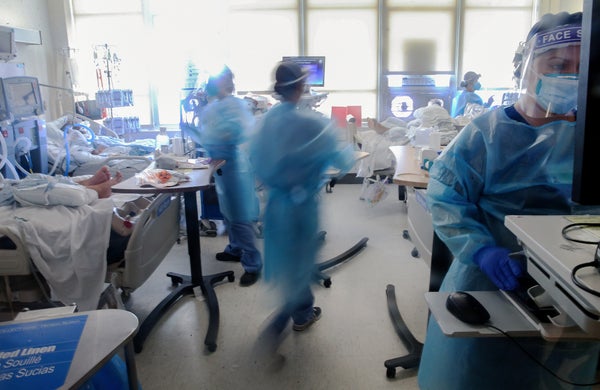The world’s attention is rightly focused on news of COVID-19 vaccine updates, from eligibility to supply. But we will make a critical error if we ignore the need for treatments as well as vaccines. Vaccines may not reach everyone for many years. Vaccines will not protect everyone. And as infection surges threaten to overwhelm hospitals and nursing homes, immediate remedies are needed. So, it is vitally important we continue to research treatments to limit and cure COVID-19.
Consider the flu, which is targeted annually with widely available and effective vaccines. But since no vaccine is perfect, there remains a significant need for flu therapies such as Tamiflu and Relenza because these drugs prevent hospitalizations and save lives. We need Tamiflu-like and Relenza-like drugs for COVID-19.
To date, the Food and Drug Administration (FDA) has only fully approved one treatment, intravenous remdesivir, for hospitalized patients. The FDA has also approved other intravenous therapies including convalescent plasma; a monoclonal antibody drug called bamlanivimab; and a cocktail of the monoclonal antibodies casirivimab and imdevimab for outpatient care under emergency use authorization (EUA). While these drugs can be helpful, their requirement for intravenous administration severely hampers their widespread use. Because EUAs are issued during an emergency, the data for drug risks and benefits are much less than required for full FDA approval. The widespread and uncontrolled use of numerous EUA drugs has made it difficult to perform proper randomized clinical trials for other new experimental treatments, because it is unethical to ask a patient to participate in a clinical trial when they may or may not receive an EUA-approved treatment.The overuse of EUAs makes it difficult or impossible to know if these therapies truly are actually effective and safe. What is badly needed is more randomized clinical trials.
On supporting science journalism
If you're enjoying this article, consider supporting our award-winning journalism by subscribing. By purchasing a subscription you are helping to ensure the future of impactful stories about the discoveries and ideas shaping our world today.
To accelerate the discovery of essential new treatments, the U.S. government needs to commit to supporting and coordinating the research. I am encouraged by President Biden’s recent executive order calling for more large-scale randomized clinical trials and further studies on the most promising treatments to date. Federal government oversight is required to properly assess the risks and benefits of current EUA treatments individually and in combination because often these drugs are used together.
Support is also required for using other available FDA-approved off-the-shelf drugs that might help prevent hospitalizations, as in the recent findings indicating colchicine, a common gout medication, prevents COVID-19 hospitalizations. At the Feinstein Institutes, we are also studying the use of famotidine, the common antacid Pepcid, in outpatients to assess whether it may also reduce the need for hospitalization. Without properly supported research, the world will not learn whether such treatments or useful or not.
President Biden should also organize an advisory panel to coordinate these clinical trial efforts and share results from outcomes and best practices. Because it is in the interest of national security, such coordination and prioritization of clinical trials cannot be left to the profit-driven pharmaceutical industry. Consider that famotidine and colchicine are off-patent and have been labeled as generics for many years. But what if they prove to be effective and safe, as well as cheap? Even if such news won’t result in big profits or move the stock price, the world should know.
Understandably and properly enough, it is a national priority to vaccinate the populace. But not at the expense of ignoring patients who will continue to become ill and need new lifesaving treatments. We are making steady progress but must significantly enhance support for research and for national coordination of clinical trial efforts.
